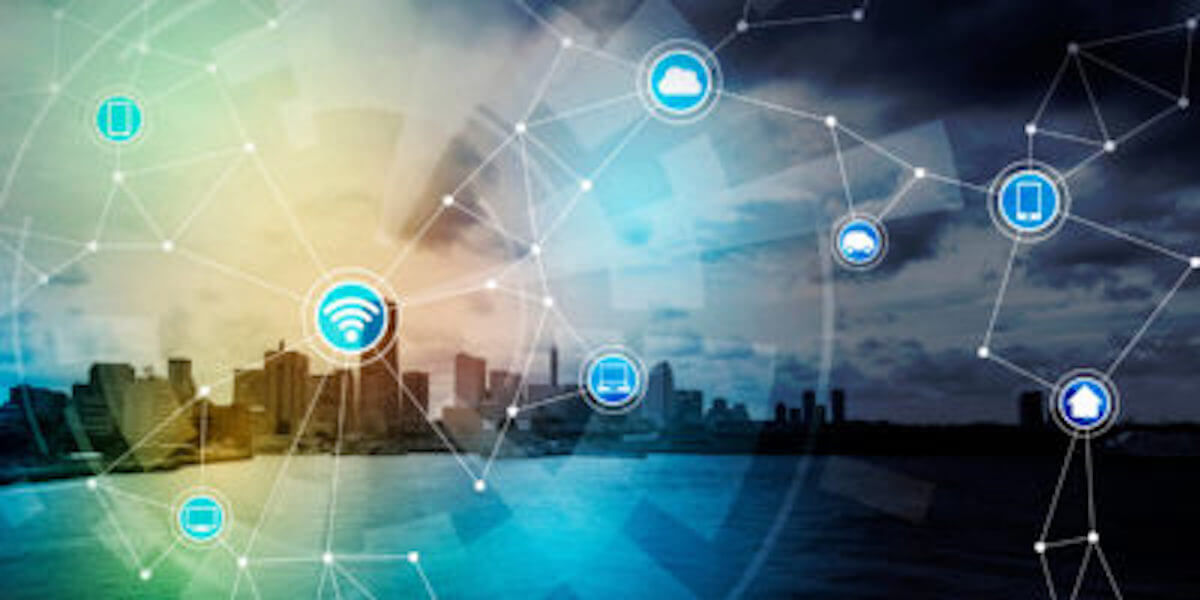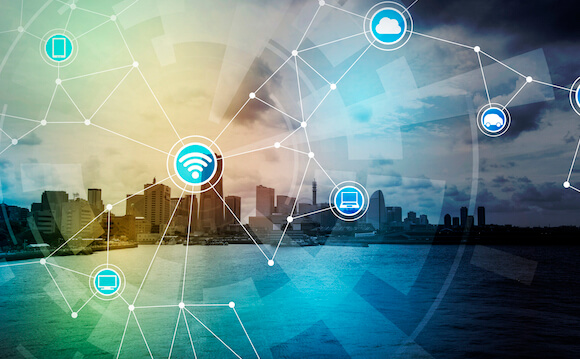

The new Center will address challenges of improving urban living through smart infrastructure.
Today the USC Viterbi School of Engineering announced the establishment of the Center for Cyber-Physical Systems and the Internet of Things (CCI).
The Center brings together faculty from multiple disciplines in the USC Viterbi School of Engineering to collaborate together and work with partners in academia, industry and government to promote innovations connecting the cyber and physical worlds via the Internet of Things to address major societal challenges. In particular, CCI will address the challenges of improving urban living through smart infrastructure & connected communities, and securing cyber-physical systems.
Directed by Bhaskar Krishnamachari, professor of electrical engineering and computer science, and Ming Hsieh Faculty Fellow, CCI includes over 30 affiliated faculty and researchers with expertise in areas as diverse as big data, machine learning, manufacturing, robotics, sensor networks, devices and circuits, synthetic and systems biology, wireless and mobile health, smart grids, smart buildings, environmental monitoring, transportation, controls, security, systems engineering, software engineering, and entrepreneurship.
The Center will promote thought leadership by organizing workshops, seminars, and other public events, by producing white papers, and by hosting prize competitions. CCI will also establish an Internet of Things (IoT) testbed at USC to evaluate new hardware, new software platforms and applications and promote interoperability of commercial IoT solutions. In addition, CCI will help develop new curricula for graduate, undergraduate and executive education programs in the areas of Cyber-Physical Systems (CPS) and IoT.
“The incoming torrent of the IoT will provide a myriad of opportunities to improve the everyday life of all people, particularly those in urban environments. CCI will serve to advance the state of the art, seek solutions to grand challenge problems, particularly as they affect society at large, and provide thought leadership across academia and the industry. A center such as CCI is also ideally suited to further expand the Silicon Beach ecosystem, in which USC Viterbi is playing an empowering role,” said USC Viterbi Dean Yannis C. Yortsos. “CPS and IoT represent a major new frontier in engineering and computer science, one which we aspire to shape and advance for the creation of new scientific knowledge for the benefit of society.”
“CPS and IoT technologies have the potential to revolutionize a wide range of fields from urban operations to manufacturing, medicine, business, education and even social work. They enable the automated collection and processing of sensor-based measurements to provide quantitative new insights about previously invisible phenomena. These new insights in turn will be used to secure and improve the performance of complex systems involving physical infrastructure as well as socio-cultural factors. By providing seamless connectivity to bridge the physical, cyber and social worlds, the Internet of Things will bring on major positive changes in how we live and work,” said CCI director, Bhaskar Krishnamachari.
CCI seeks to partner with relevant industry organizations and government agencies to form a consortium. Consortium members will have an opportunity to partner on cutting-edge research , collaborate on new research topics, and participate in the center’s workshops and educational programs. In addition, CCI events will provide networking opportunities for companies, organizations and students.
The following USC faculty have committed to participating in CCI:
CCI Leadership Council: Andrea Belz (Vice Dean for Technology Innovation and Entrepreneurship), S. K. Gupta (Professor, Mechanical and Aerospace Engineering), Alefiya Hussein (Computer Scientist, Information Sciences Institute), Cyrus Shahabi (Professor, Computer Science), Neil Siegel (Professor, Industrial and Systems Engineering), Azad Madni (Professor, Astronautical Engineering), Mahta Moghaddam (Professor of Electrical Engineering), Donald Paul (Executive Director, USC Energy Institute), Viktor Prasanna (Professor, Electrical Engineering).
CCI Affiliated Faculty: Murali Annavaram (CS Mobile Computing), Salman Avestimehr (EE, Communication Theory), Nora Ayanian (EE, Robotics), Burcin Becerik-Gerber (CEE, Smart Buildings), Paul Bogdan (EE, Cyber Physical Systems Theory), Young Cho (ISI, Sensor Networks and Internet of Things), Dina El-Damak (EE, Low power Devices and Circuits), Ramesh Govindan (CS, Networks), Satyandra K. Gupta (MAE, Smart Manufacturing), GJ Halfond (CS, Software Engineering), Hossein Hashemi (EE, RF Circuits), Alefiya Hussain (ISI, CPS Testbeds), Rahul Jain (EE, Control Theory and Network Economics), Mihailo Jovanovic (EE, CPS and Control Systems), Bhaskar Krishnamachari (EE, IoT and wireless networks), Behrokh Khoshnevis (ISE, Telefacturing), Yan Liu (CS, Machine Learning), Azad Madni (SAE, System of Systems Engineering), Mahta Moghaddam (EE, Remote Sensing), Neno Medvidovic (CS, Software Engineering), Andreas Molisch (EE, Radio Modeling), Naveed Muhammad (CS, Cybersecurity), Pierluigi Nuzzo (EE, CPS Design), Antonio Ortega (EE, Graph Signal Processing), Donald Paul (Energy), Viktor K. Prasanna (EE, Data Science and Smart Grid), Konstantinos Psounis (EE, Networks), Ketan Savla (CEE, Transportation), Fei Sha (CS, Machine Learning), Cyrus Shahabi (CS, Big Data), Neil Siegel (ISE, Cybersecurity), Mahdi Soltanolkotabi (EE, Optimization), Gaurav Sukhatme (CS, Robotics), Insoon Yang (EE, Controls and Optimization).
(USC Viterbi departments, programs and institutes represented in CCI: Ming Hsieh Department of Electrical and Computer Engineering, Department of Computer Science, Sonny Astani Department of Civil and Environmental Engineering, Daniel Epstein Department of Industrial and Systems Engineering, Department of Aerospace and Mechanical Engineering, the Information Science Institute, and the Program on Systems Architecting and Engineering)
Published on October 13th, 2016
Last updated on January 10th, 2019

